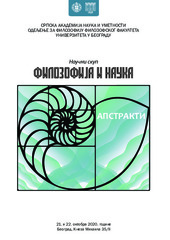Приказ основних података о документу
Naučno saznanje i filozofija: slučaj moralne odgovornosti
Scientific Knowledge and Philosophy: The Case of Moral Responsibility
| dc.creator | Mijić, Jelena | |
| dc.date.accessioned | 2023-03-15T17:50:21Z | |
| dc.date.available | 2023-03-15T17:50:21Z | |
| dc.date.issued | 2020 | |
| dc.identifier.uri | http://reff.f.bg.ac.rs/handle/123456789/4288 | |
| dc.description.abstract | Како у свакодневном животу, тако и у праву, већину људи сматрамо одговорним за поступке претпостављајући да су то њихови поступци, у смислу да над њима имају контролу. Претпоставка која доминира традиционалним филозофским расправама о моралној одговорности и теоријама казне јесте да ће се особа сматрати морално (правно) одговорном за почињени поступак ако тај поступак зависи од ње на такав начин да би заслужила осуду (казну) односно похвалу (награду). Расправе о појму моралне одговорности су у њутновском контексту обликоване у форму проблема компатибилности: можемо ли бити морално одговорни у детерминистичком свету? Изазов који природне науке постављају пред овакво разумевање моралне одговорности не зауставља се на класичној механици већ свој нови, комплекснији облик задобија интерпретацијама квантне механике, али и развојем неуронауке и психологије. Релевантност истраживања природних наука за филозофске проблеме објашњавамо чињеницом да су другу половину XX века обележила натуралистичка метафизичка и епистемолошка настојања филозофа. Натурализам грубо одређујемо као гледиште према ком филозофско истраживање треба да буде усклађено са природним наукама. На овај начин је отворено ново поглавље односа филозофије и природних наука, а ми га у овом раду испитујемо кроз разматрање проблема компатибилности детерминизма и моралне одговорности. Циљ рада је да испитивањем емпиријских аргумената којима се у питање доводи морална одговорност, али филозофских аргумената који фигурирају у овим дискусијама укажемо да резултати научних истраживања могу бити плодоносни у контексту расправа о слободи воље, моралне одговорности и теорија казне искључиво ако на адекватан начин комуницирају са резултатима филозофских истраживања заснованих на примени филозофских метода попут појмовне анализе. | sr |
| dc.description.abstract | Both in everyday life and law, we hold most people responsible for their actions, assuming that they have control over them. The assumption that dominates traditional philosophical debates about moral responsibility and theories of punishment is that agents are morally (legally) responsible for their actions if those actions depend on them in such a way that they would deserve blame (punishment) or praise (reward). In the Newtonian context, discussions on the concept of moral responsibility gain their prominence through compatibility problem: can one be morally responsible in a deterministic world? The challenge natural sciences pose to moral responsibility does not stop at classical mechanics, but acquires its new, more complex form due to quantum mechanics and the development of neuroscience and psychology. The relevance of natural science research for philosophical problems lies in the fact that the naturalistic metaphysical and epistemological efforts marked the second half of the 20th century. Naturalism is roughly defined as the view that philosophical research should be in accordance with the natural sciences. Thus began a new chapter of the relationship between philosophy and natural sciences, and we explore it in this paper by considering the problem of compatibility of determinism and moral responsibility. This paper aims to examine not only the empirical arguments that call into question moral responsibility, but also to consider the philosophical arguments appearing in these discussions. Hopefully, those considerations will show that the results of scientific research might be fruitful in the context of discussions of free will, moral responsibility, and punishment theory, only if they concur with the philosophical results based on the application of methods such as the philosophical method of conceptual analysis. | sr |
| dc.language.iso | sr | sr |
| dc.publisher | Српска академија наука и уметности, Београд | sr |
| dc.publisher | Универзитет у Београду – Филозофски факултет, Одељење за филозофију | sr |
| dc.rights | openAccess | sr |
| dc.rights.uri | https://creativecommons.org/licenses/by/4.0/ | |
| dc.source | Научни скуп Филозофија и наука, 21. и 22. октобра 2020. године, Београд - Апстракти | sr |
| dc.title | Naučno saznanje i filozofija: slučaj moralne odgovornosti | sr |
| dc.title | Scientific Knowledge and Philosophy: The Case of Moral Responsibility | sr |
| dc.type | conferenceObject | sr |
| dc.rights.license | BY | sr |
| dc.citation.epage | 38 | |
| dc.citation.rank | M64 | |
| dc.citation.spage | 37 | |
| dc.identifier.fulltext | http://reff.f.bg.ac.rs/bitstream/id/10397/Knjiga-apstrakta-Filozofija-i-nauka-1.pdf | |
| dc.identifier.rcub | https://hdl.handle.net/21.15107/rcub_reff_4288 | |
| dc.type.version | publishedVersion | sr |
| dc.identifier.cobiss | 27117577 |

